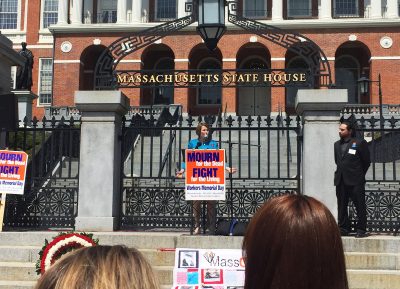
In 2016, 70 workers in Massachusetts lost their lives in the workplace, with fatal injuries leading to 61 of the worker deaths in addition to nine firefighters who passed away from work-related diseases, according to a report published by the Massachusetts Coalition for Occupational Safety and Health and the Massachusetts American Federation of Labor and Congress of Industrial Organizations.
The 2017 “Dying for Work in Massachusetts” report highlights the number of preventable deaths resulting from workplace illnesses and injuries, which is at a 10-year high, and calls for responsive legislative action, according to an official press release from MassCOSH.
Transportation-related incidents were the leading cause of death in the state, contributing to 41 percent of worker deaths caused by injuries, according to the report. Other causes of death include fatal injuries due to falls, slips and trips, contact with objects or equipment, exposure to harmful substances or environment, and violence.
Jeff Newton, the membership and communications coordinator for MassCOSH, said the annual report is designed to illuminate the issue of worker health and safety.
“Many, many families are shattered by workplace fatalities and injuries every year,” Newton said. “This is our opportunity to draw attention to that, [and to] recognize those who had to sacrifice their lives for a paycheck and demand that more be done to protect all workers.”
Although the record number of deaths is not caused by one particular reason, Newton said, the statistic does demonstrate that the state is moving backward when it comes to workplace health and safety, and more can be done to combat this issue.
Newton said he hopes the report influences how elected officials, employers and the general public perceive worker health and safety.
“I hope that it changes how are elected officials view occupational safety and health, [and] that employers who value profits over people feel a little bit of pressure to institute protections that help protect workers,” Newton said. “We hope that the general public sees these figures and demand more be done through their elected officials to protect them.”
In terms of progressing the rights of workers in Massachusetts, Newton said he hopes to see legislation addressing the problem that state workers, other than executive branch employees, are not covered by the Occupational Safety and Health Administration.
“We have two separate systems for protecting [workers], one is federal protections and one is just state protections,” Newton said. “If you work for the town of Plymouth and you’re putting up telephone poles, [and] you died, OSHA would have no ability to investigate [or] see what can happen in the future to prevent it.”
Gabrielle Turi and Till Kaeslin contributed to the reporting of this article.




